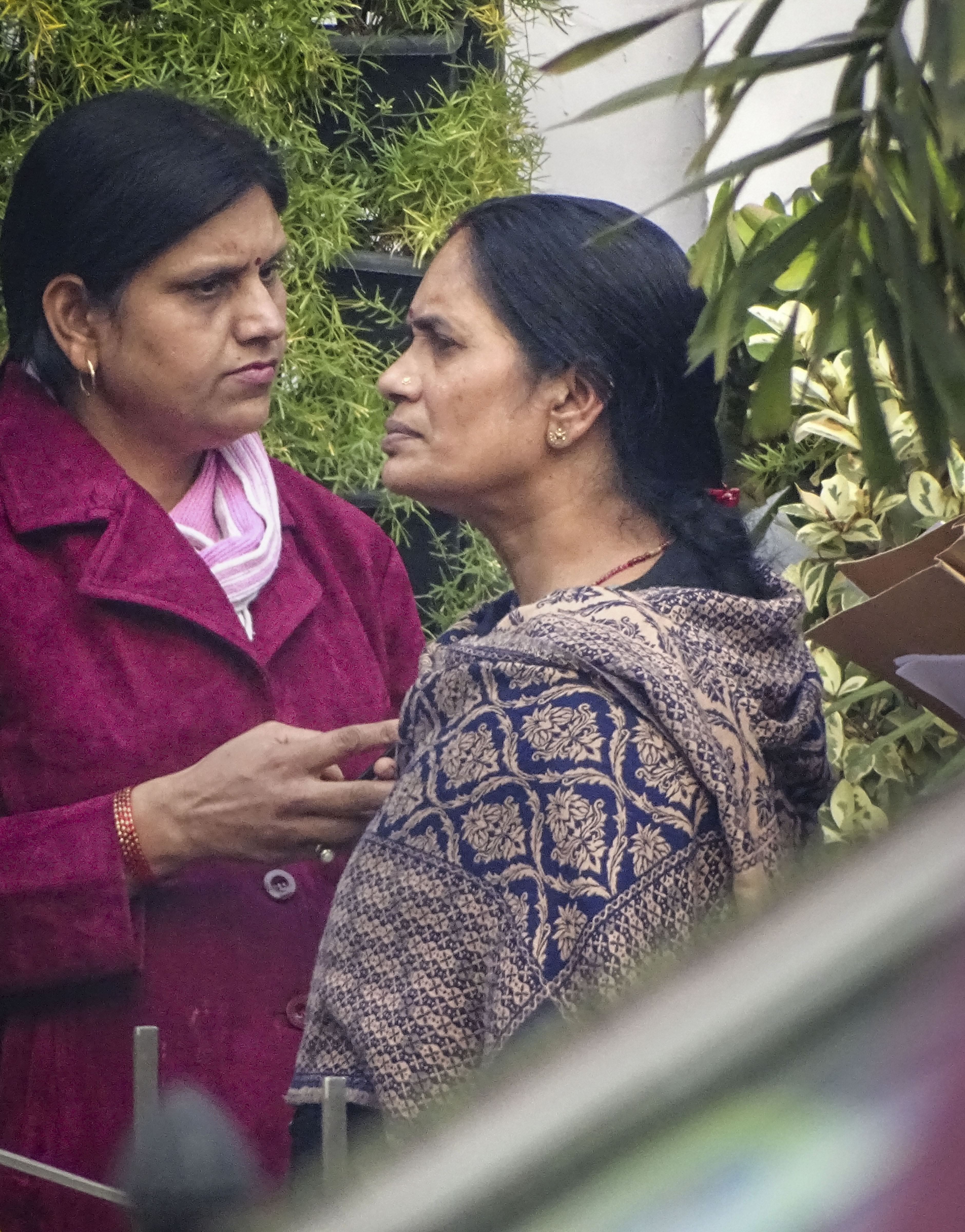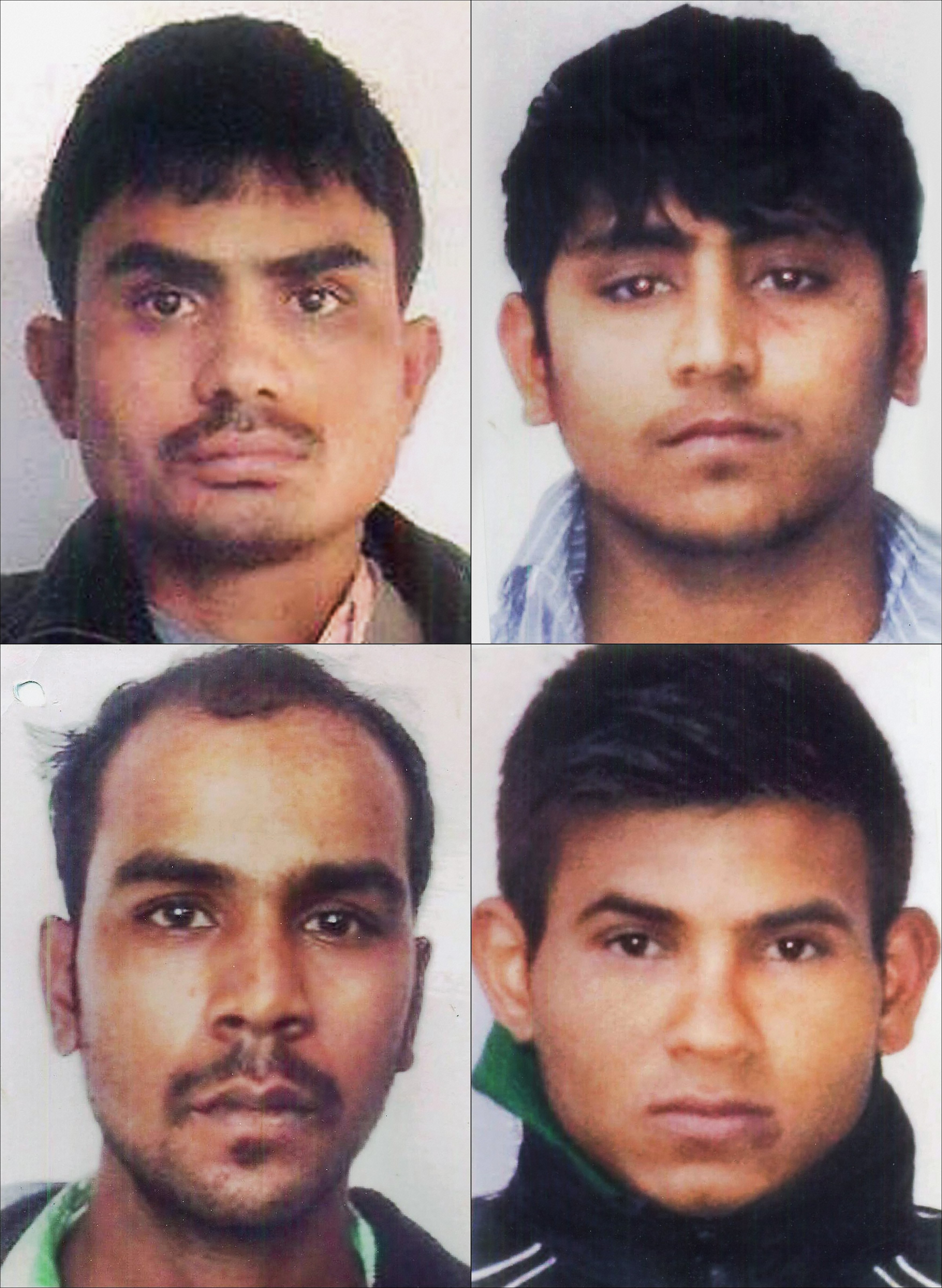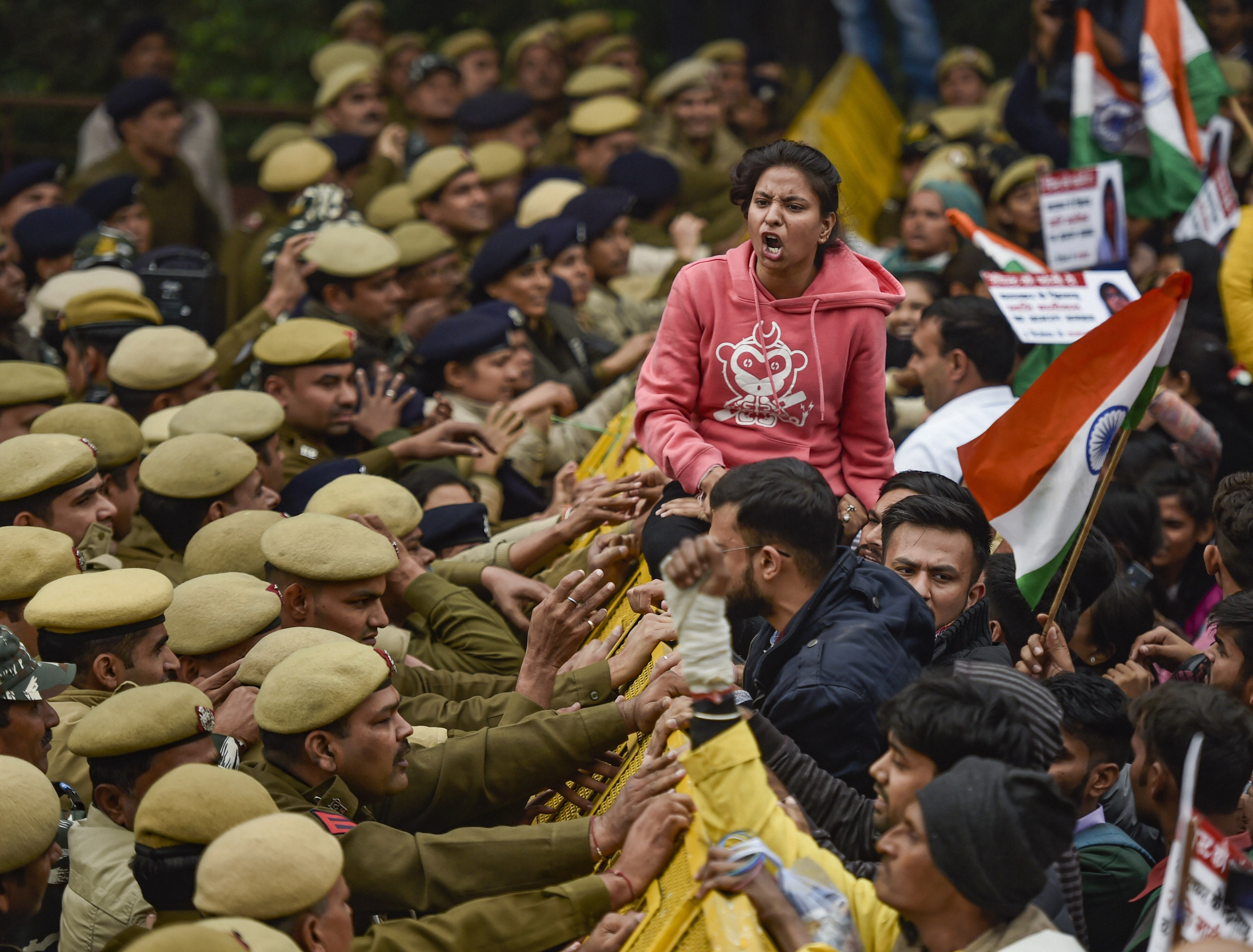***
In the absence of any worthwhile clues, DCP Chhaya knew that if the case was to be cracked, locating the bus was critical. All that was known from Awindra’s account, besides its colour and the stripes painted on its sides, was that it had a separate driver’s cabin, red seat covers and yellow curtains, and that the hubcap of the front left wheel was missing.
She summoned the ten best inspectors of the south district to the Vasant Vihar police station with their respective teams. Inspector Rajender Singh of the Special Staff—an experienced and versatile officer—was the star investigator amongst them. DCP Chhaya allocated specific jobs to each inspector and made the police station her mission control room. None of them went home for five days and nights, not until the last accused had been arrested.
One team left for the Delhi Transport Department to get details of all white buses registered with them… the police had the details of 320 white buses….
Inspector Rajender Singh and two other teams scoured the CCTV footage from all hotels and guest houses on the national highway opposite the crime scene. Interestingly, the police teams noticed a white bus with ‘Yadav’ painted on its side in the CCTV footage of Hotel Delhi Airport. The bus was seen coming from Delhi, seemingly heading for Gurugram, but within nineteen minutes, at 9.53 p.m., it reappeared on the screen, heading again in the same direction. The obvious conclusion was that it had taken a U-turn from under the flyover located close by, proceeded towards Delhi instead of going towards Gurugram, and had again turned around to drive towards Gurugram.
The CCTV footage of the white bus was shown to Awindra, who confirmed that it indeed looked like the bus he had boarded. He looked intently at the front left wheel, and sure enough, it did not have a hubcap. The search for the white bus had now zeroed in on those that had Yadav written on their side...
The teams began to question the transporters if they knew anyone who owned buses with Yadav written on their vehicles. The name of one Dinesh Yadav of Noida, a city in Uttar Pradesh, came up. He owned a fleet of buses, most of which had his surname written on them. When questioned, Dinesh confirmed that he did indeed own a bus that had red seat covers, yellow curtains and Yadav written on its side. The bus, as disclosed by him, was on charter with Birla Niketan School in Saket. He further disclosed that the driver was named Ram Singh and lived in one of the shanties of Guru Ravi Das Camp, a slum abutting Sector 3 of R.K. Puram in south Delhi. The driver usually parked the bus in the vicinity of his abode.
By then it was 11 a.m. on 17 December, the day following the crime. A police team rushed to Guru Ravi Das Camp and saw the bus parked there… On inquiring where the bus’s driver resided, the jhuggi was found and Ram Singh (aged thirty) was nabbed. He took the police team to the bus, which was inspected in the presence of witnesses. It had been washed from the inside and every effort made to obliterate all traces of evidence. A forensic team was called, which recovered two bloodstained iron rods, a debit card in the name of Asha Devi (Nirbhaya’s mother), traces of blood, hair and spit from inside the bus. A T-shirt and a pair of bloodstained brown slippers were also seized…
Despite the seizure of the bus and other pieces of incriminating evidence, Ram Singh, when brought to the police station, denied his involvement in the crime... He tried to pass on the blame to his brother Mukesh, who, he said, had taken the bus the previous evening without his permission. On being asked about Mukesh’s whereabouts, Ram Singh said he had run away to their village in Rajasthan.…
It was only at 4 p.m. on 17 December—the day after the crime—that Ram Singh (aged thirty-four) accepted his involvement and gave a graphic account of the sequence of events. The details given by him matched Awindra’s statement. He was placed under arrest...
****
From the accused Ram Singh the role of Akshay Kumar Singh aka Thakur had come to light. Akshay worked with Ram Singh as a cleaner of the bus. Ram Singh knew the mobile number Akshay called to speak to his family back home. He shared the number with the police; it was registered with a service provider in Aurangabad, Bihar. A team under Inspector Rituraj was dispatched by air to Patna on 18 December...
On 19 December, the Delhi Police team established contact with the staff of the police station in Tandwa, in whose jurisdiction Akshay’s village was located... They planned to recce Akshay’s village stealthily so as not to alarm its residents…
On 21 December, Akshay was spotted by a chowkidar getting off from a train at Tandwa railway station and then walking towards his village. The chowkidar lost no time in informing Inspector Rituraj, who rushed with his team and arrested Akshay. The news of Akshay’s arrest was conveyed to us before noon on 21 December.
***
Raju—the juvenile in conflict with the law—was the only accused left to be arrested. He was the one who had hailed Nirbhaya and Awindra at the Munirka bus stand to board the bus. Ram Singh had disclosed that Raju had stayed with him on the night of 15 December—the day prior to the crime. The two knew each other as they had worked together two years earlier in the trans-Yamuna area.
The police did not know Raju’s real name, his cellphone number or his address. None of the other accused knew anything about him.
In the absence of any specific clues, the police went to the trans-Yamuna area, which has a population of 50 lakh in a 50 square kilometre area. It was much like looking for the proverbial needle in a haystack. Police teams fanned out in the area and started asking for a boy named Raju at various bus depots located in east Delhi... The persons who claimed that they had met Raju were requested to be part of the search teams to identify the boy. The search for Raju continued for three days and nights.
Finally, a local resident, who had joined the police search for Raju, spotted a youngster who he thought was Raju in a bus plying between the Anand Vihar bus terminal and Noida. The search then zeroed in on buses plying that route.
On the morning of 21 December, the spotter identified Raju on a bus returning to Anand Vihar from Noida. As soon as this information was relayed to the police, a team rushed to the Anand Vihar bus station and nabbed the juvenile. With Raju’s arrest, all accused involved in the dastardly crime were in our custody.
****
Much before SI Arvind reached Delhi with Mukesh on the afternoon of 18 December, Ram Singh had begun to sing like a canary. He disclosed that in the early evening of 16 December (a Sunday) Pawan Kumar, a fruit vendor, Vinay, a gym instructor, Mukesh, Ram Singh’s younger brother, Akshay Kumar Singh, a cleaner on Ram Singh’s bus, and Raju, a juvenile, met in his jhuggi and had a small ‘party’. They decided to set out together in Ram Singh’s bus to have some ‘fun’. They first lured Ram Adhar (aged thirty-five), a carpenter, to board the bus and robbed him of Rs 1500 along with his other belongings and dumped him near IIT Gate. They then drove towards Munirka from where they picked up the hapless couple.
Ram Singh then pointed out Pawan’s hutment in Guru Ravi Das Camp from where he was picked up at 1.15 p.m. on 18 December. Vinay was arrested from outside his gym, again in Ram’s neighbourhood, at 6 p.m. the same day. The data from both Pawan’s and Vinay’s phones corroborated their presence along the route that the bus had taken. We had four of the six accused in our custody. It was time for us to let the world know of the breakthrough in the case and of the arrests we had made.
It was 10.20 p.m. on 16 December 2012. The incessant traffic on National Highway 8 between Delhi and its satellite city, Gurugram, refused to abate even though it was well past peak hours… The biting cold of Delhi winter was yet to set in, but for two youngsters—one male and one female—who had been lying by the roadside without a stitch of clothing on them for almost forty minutes, it was chilling to the marrow.
Raj Kumar and his partner Surender Singh, of EGIS Infra Management India Ltd, a firm charged with the maintenance of the national highway, drove slowly in their jeep in the left lane of the highway from Gurugram to Delhi. They were looking for stretches in disrepair that might need the attention of their superiors. As they crossed the U-turn under the Mahipalpur flyover, they heard cries of ‘bachao, bachao (help, help) from the left flank of the road. They were startled to see a young man and a young woman sitting naked, covered in blood, shivering and writhing in pain. They immediately stopped and called Rampal Singh in their company’s control room, informed him of what they had seen and requested him to call the police.
Rampal Singh lost no time in calling the Delhi Police control room (PCR) on the emergency telephone number, 100, which dispatched the nearest PCR van, Zulu 54, to the spot…
The police team rushed the severely injured couple to Safdarjung Hospital, which was about 10 kilometres away. En route, the injured, despite being in a state of shock, narrated snatches of their nightmarish ordeal to constable Ram Chander, a summary of which he passed on to the central PCR.
On arrival at the hospital, the male victim, by then identified as Awindra Pandey (aged twenty-eight), was admitted to the casualty section of the hospital. The female victim, Nirbhaya (a name given to protect the identity of the girl and universally accepted) (aged twenty-three), was taken to the gynaecology department as her private parts were bleeding profusely.
The PCR had by then informed DCP Chhaya Sharma of the incident. Realizing the gravity of the situation, she rushed to the hospital. Dr Sachin Bajaj, who was treating Awindra, had already heard from his patient the details of the ordeal the victims had been through. In brief they were as follows:
Awindra, an engineer, and his girlfriend Nirbhaya, a physiotherapy intern, had gone to the Select City Walk mall in Saket in south Delhi to watch a movie…. After the show they exited the mall at around 8.30 p.m. Unable to get an autorickshaw to Dwarka, where they lived, they took one to the Munirka bus stand from where they hoped to get a bus that would take them to their destination…
After a while, they saw a white bus with yellow and green stripes on its sides approach them and stop right where they stood. It was a private chartered bus—generally not authorized to ply on commercial routes— from which a young boy was calling out for passengers going to Dwarka and Palam Mod. Awindra and Nirbhaya, unsure of when the regular bus would come and anxious to reach their homes before it got too late, decided to board the private bus. Little did they know they had boarded a bus to hell.
As they took their seats they saw three unkempt youngsters sitting in the driver’s cabin with the driver, while two others sat right behind in the front row of passenger seats—one on the left and the other on the right end. There were no other passengers in the bus. Instinctively, the young couple felt that something was not quite right.
One of the two seated in the front passenger seats walked towards Awindra, ostensibly to collect the bus fare. They paid twenty rupees between them. It dawned on them that the bus had not waited for any other passenger to board and had left with only the two of them, soon after they had got in. Strangely, the bus had curtains that were all drawn to ensure that nothing outside was visible to them. The door they had come in through had been locked from the inside after they had boarded…
As the bus drove towards Dwarka and reached the flyover leading to the airport, the three boys emerged from the driver’s cabin. They began to abuse Awindra, asking him where he was taking the girl so late in the night… Nirbhaya and Awindra retaliated to the verbal and physical abuse hurled at them. In the commotion that ensued, they heard one of the goons call out the names Vinay and Pawan, commanding them to bring out iron rods. Soon Awindra was hit on the head and legs with iron rods and he fell to the floor of the bus…
Nirbhaya shouted for help and tried calling the police on her mobile… She was pushed to the rear end of the bus and then pinned down on a passenger seat meant for three, where all six men took turns to rape her. As punishment for her fierce resistance, she was hurt grievously with iron rods in ways so gory and sordid that I will refrain from describing them to my readers. She too was robbed of her belongings and was stripped naked. Having satiated themselves, the men decided to get rid of the injured couple, and if possible, kill them. Awindra heard one of the assailants say that the couple was not to be left alive...
A naked Nirbhaya was dragged by her hair to the front door and thrown out along with her companion, who was also without a shred of clothing on him. The bus tried to reverse and crush them to death but somehow the two managed to roll away and escape.…
****
Ram Singh’s interrogation revealed the involvement of his brother Mukesh (aged twenty-six), his neighbours Pawan (aged nineteen) and Vinay (aged twenty), his bus cleaner Akshay Kumar Singh (aged twenty-eight), and lastly, a youngster he knew as Raju (name changed as he is a juvenile in conflict with the law)...
On the evening of 17 December—the day Ram Singh was arrested—SI Arvind Kumar of the Special Task Force of the south district left with a police team of six for Karoli in Rajasthan, 300 kilometres away from Delhi. His mission was to nab Mukesh, Ram Singh’s younger brother. The police team drove all night and reached Karoli in the wee hours of the following day...
The village was 2 kilometres away from the nearest road, and the approach to it was not motorable. The police party had to cover the distance on foot. The hut in which Ram Singh and Mukesh’s parents lived was not in the main village but in the middle of an agricultural field, a little distance away. What stood between the police team and the hut was a river with neither a bridge across it nor any ferry service. The police team realized that they would have to swim across it. One member of the team, a consummate swimmer, was sent in advance to check how deep the river was. Luckily, it was crossable, but there was one difficulty—the AK rifles and pistols the policemen were carrying would have to be protected from being submerged in water. Undeterred, the policemen stepped into the icy waters of the river with their weapons raised above their heads. A few of them were not tall enough to keep their heads above water and had to walk on their toes…
Mukesh, who had been hiding out with his parents, was caught unawares. The police team, with Mukesh in custody, had to cross the river again and hurry to their vehicles. The police party, without wasting any time, drove back to Delhi.

Penguin Random House

Mother of Nirbhaya case victim outside the Patiala House Court in New Delhi, Tuesday, January 7, 2020. PTI
Excerpted from Khaki Files -- Inside Stories of Police Investigations by Neeraj Kumar, with permission from Penguin Random House












